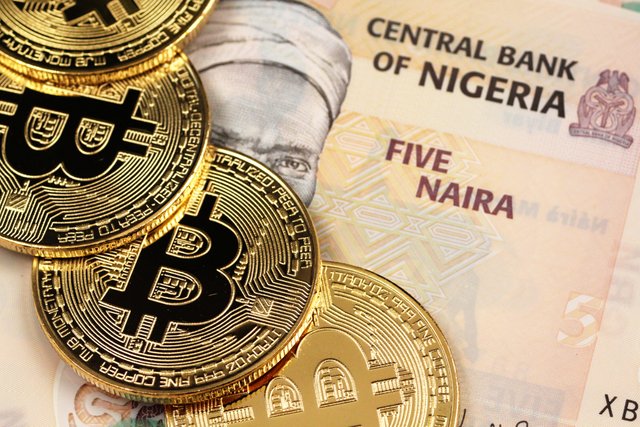The proportion of the population that has traded cryptocurrency is the world's first why this African country is obsessed with Bitcoin.

In the past five years, Nigeria's bitcoin transaction volume has ranked second in the world, second only to the United States.
The world's most enthusiastic country for holding bitcoin is Nigeria?
According to an online survey conducted by data platform Statista in 2020, 32% of Nigerians have owned or used cryptocurrency, which is higher than any country in the world.
If the online survey has its limitations, then the transaction volume can better reflect the actual situation. According to the statistics of Bitcoin statistics provider Coin Dance, Nigeria’s transaction volume on the African Paxful trading platform has ranked second in the world in the past five years. Second to the United States.
Against the background of continued buying by investors and the support of payment institutions, the spot price of cryptocurrency Bitcoin exceeded $50,000 for the first time on February 16. As of press time, the price of Bitcoin is still hovering around $50,000, and this year's increase has exceeded 60%.
Bitcoin in Nigeria
Tola Fadugbagbe (Tola Fadugbagbe) was originally a young man from a small town in Nigeria. More than ten years ago, he came to Lagos, the economic center of Nigeria, with a good vision to make a living. However, like most people, in the city, he only Can do ordinary work every day and earn a meager salary.
His story seemed nothing special, but in 2016, his fate had changed. One day, he saw an advertisement for Bitcoin when he was online, which immediately aroused his interest and began his story with Bitcoin.
He said: "I started to study carefully," spending several hours a day watching videos about Bitcoin and reading related articles. Since he didn't have many deposits, he started investing in Bitcoin for one or two hundred dollars.
Today, Fadubabe said that the total value of his cryptocurrency has exceeded 200,000 US dollars, and trading cryptocurrency has become his full-time job, and he also provides training for new investors. He doesn't seem to worry that the cryptocurrency bubble will eventually burst.
The success story of Fadubaby has attracted thousands of Nigerians to use cryptocurrencies such as Bitcoin. Nigeria experienced a severe economic crisis in 2016, and was affected by the new crown pneumonia epidemic. In 2020, Nigeria's economy fell again.
The Nigerian currency, the Naira, has depreciated by 24% in 2020, and I am afraid that it will further depreciate by 10% this year. At the same time, prices have soared, and the food price index has risen to its highest point since July 2008.
In this economic context, many people have chosen Bitcoin as their investment object for a simple reason, because the naira has been depreciating in the past year, while Bitcoin has been increasing in value. However, economists from various countries have warned that Bitcoin and other cryptocurrencies are high-risk investments.
In Nigeria, people also choose Bitcoin as a remittance tool. Nigeria's financial services are relatively lacking, and funds from Nigeria to other countries are often charged high commissions. With the advent of cryptocurrencies, they have more choices.
For example, if a Nigerian in London remits £100 to Nigeria through the traditional method, various handling fees may be as high as 10%. In contrast, the fees charged by the intermediary platform are about 2%-2.5% when using Bitcoin transactions.
Nigeria bans cryptocurrency trading
As Bitcoin payments entered the streets of Nigeria, it has aroused the vigilance of the Nigerian government.
On February 5, the Central Bank of Nigeria issued an official letter requiring the country’s banks, non-bank financial institutions and other financial institutions to immediately close all accounts involved in cryptocurrency transactions, and prohibit the buying and selling of cryptocurrencies or providing payment facilities for such transactions. . The central bank warned that non-compliance with the directive will lead to "severe regulatory sanctions."
In fact, as early as 2017, the Central Bank of Nigeria issued a ban on Bitcoin, but it has not been strictly enforced. The promulgation of the ban has aroused widespread concern and controversy in Nigeria. Some young Nigerians believe that the ban will stifle innovation and freelance work, further increase the country’s unemployment rate, and hinder the country’s digital economy.
Others welcome the ban, believing that the ban will block illegal transactions, especially the sources of funds for armed insurgents.
However, the popularity of cryptocurrencies such as Bitcoin in Nigeria has also aroused the reflection of the Nigerian government. Nigerian Vice President Yemi Osinbajo said in a speech on February 26 that Nigeria needs to find a way to regulate cryptocurrency, rather than ban it, so as to promote economic growth and institutional innovation.
"In the next few years, cryptocurrency will challenge traditional banking in ways we can't imagine, so we need to prepare for this huge change." He said.